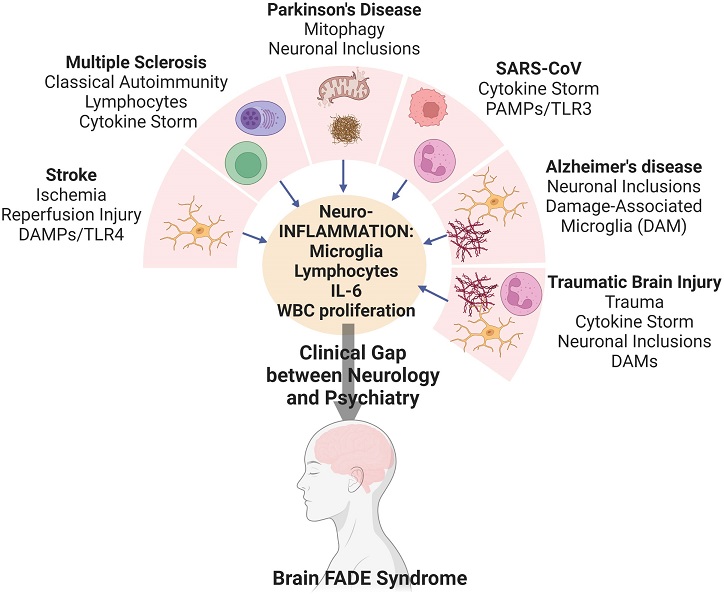COVID-19 News: Chronic Neuroinflammation And The Enigma Of Brain FADE Syndrome In Neurological Diseases
Nikhil Prasad Fact checked by:Thailand Medical News Team Feb 04, 2024 1 year, 2 months, 1 week, 5 days, 1 hour, 40 minutes ago
COVID-19 News: The intricate relationship between inflammation and neurological diseases has emerged as a focal point of research, prompting a paradigm shift in our understanding of conditions such as stroke, multiple sclerosis, Parkinson's disease, Long COVID, Alzheimer's disease, and traumatic brain injury. At the forefront of this exploration lies the Cooper Neurological Institute and Cooper Medical School at Rowan University, New Jersey, USA, where a groundbreaking investigation into chronic neuroinflammation and its implications on cognitive health is underway. This
COVID-19 News report seeks to delve deeper into the complexities of chronic inflammation and its connection to Brain FADE Syndrome, shedding light on the pathophysiological mechanisms and potential therapeutic interventions across a spectrum of neurological disorders.
 Chronic Neuroinflammation And Brain FADE Syndrome In Neurological Diseases
The Emergence of Brain FADE Syndrome
Chronic Neuroinflammation And Brain FADE Syndrome In Neurological Diseases
The Emergence of Brain FADE Syndrome
Brain FADE Syndrome, characterized by cognitive Fog, Asthenia, and Depression Related to Inflammation, represents a multifaceted challenge in the realm of neurology. While the symptoms of depression, fatigue, and cognitive impairment are prevalent across various neurological diseases, their underlying etiology rooted in chronic inflammation remains a subject of extensive investigation. The Cooper Neurological Institute's pioneering work underscores the importance of unraveling the intricate interplay between inflammation and neurological manifestations, paving the way for targeted therapeutic strategies aimed at mitigating the burden of Brain FADE Syndrome.
Stroke: Unraveling the Complex Relationship
Stroke, a leading cause of disability and mortality worldwide, exemplifies the complex interplay between inflammation and neurological dysfunction. Studies, such as the FLAME trial, have explored the potential of fluoxetine in ameliorating post-stroke depression and motor recovery, shedding light on the neuroprotective effects of antidepressants. However, large-scale trials like FOCUS, EFFECTS, and AFFINITY have yielded conflicting results, underscoring the need for a deeper understanding of the underlying inflammatory mechanisms. Anti-inflammatory agents, including NSAIDs and statins, have shown promise in reducing post-stroke depression, highlighting the potential therapeutic avenues for addressing Brain FADE Syndrome in stroke survivors.
Multiple Sclerosis: A Model of Cerebral Inflammation
Multiple sclerosis (MS), renowned for its association with cerebral inflammation, serves as a model for understanding the intricate connections between chronic inflammation and cognitive dysfunction. The Satralizumab trial, a landmark study in MS management, provides valuable insights into the potential role of immunomodulatory drugs in mitigating Brain FADE Syndrome. Furthermore, studies exploring the relationship between inflammation and symptoms such as fatigue, cognitive fog, and depression underscore the need for comprehensive investigations into the causal roles of inflammatory mediators in MS pathology.
&
amp;nbsp;
Parkinson's Disease: Chronic Inflammation and Unexplored Frontiers
Chronic inflammation in Parkinson's disease has been linked to a spectrum of neurological symptoms, including cognitive impairment and depression. Despite this association, large-scale anti-inflammatory trials are scarce, leaving a significant gap in our understanding of Brain FADE Syndrome in Parkinson's patients. Ongoing drug trials, such as AZA-PD and deferiprone, offer promising avenues for addressing inflammation; however, the exploration of Brain FADE as an endpoint remains elusive, emphasizing the need for targeted interventions aimed at mitigating cognitive decline and mood disturbances in Parkinson's disease.
Long COVID: Unmasking the Aftermath
The global COVID-19 pandemic has unmasked a new frontier in neurology, with Long COVID emerging as a significant concern for recovered patients. Chronic inflammation post-COVID has manifested as the postacute sequelae of SARS-CoV-2 infection (PASC), presenting symptoms akin to Brain FADE Syndrome. Exploring the persistent viral load and inflammatory components offers valuable insights into the pathophysiological mechanisms underlying Long COVID, necessitating targeted interventions aimed at mitigating cognitive dysfunction and mood disturbances in affected individuals.
Alzheimer's Disease: Avenues for Untapped Potential
In Alzheimer's disease, chronic inflammation plays a crucial role in disease progression and cognitive decline. Despite extensive research efforts, the exploration of Brain FADE Syndrome as an endpoint in Alzheimer's trials remains limited, highlighting the need for targeted interventions aimed at addressing cognitive impairment and mood disturbances in affected individuals. The MARBLE study, a notable endeavor in Alzheimer's research, offers valuable insights into the potential role of anti-inflammatory agents in mitigating Brain FADE Syndrome and improving cognitive outcomes in affected individuals.
Traumatic Brain Injury: Bridging the Divide with PTSD
Traumatic brain injury (TBI) presents a unique challenge in understanding the complex interplay between inflammation, cognitive dysfunction, and mood disturbances. Chronic inflammation post-TBI has been linked to the development of post-traumatic stress disorder (PTSD) and Brain FADE Syndrome, underscoring the need for targeted interventions aimed at mitigating inflammation and improving cognitive outcomes in affected individuals. The TRACK-TBI study, a landmark endeavor in TBI research, offers valuable insights into the epidemiological factors contributing to Brain FADE Syndrome, paving the way for targeted interventions aimed at improving cognitive function and mood outcomes in affected individuals.
Conclusion: Charting a Path Forward
In conclusion, chronic neuroinflammation emerges as a critical factor in the manifestation of Brain FADE Syndrome across various neurological diseases. The Cooper Neurological Institute's pioneering work underscores the importance of unraveling the intricate interplay between inflammation and neurological manifestations, paving the way for targeted therapeutic strategies aimed at mitigating the burden of Brain FADE Syndrome. As neuroscience embraces a broader understanding of the final common pathway, future research must prioritize Brain FADE as an endpoint, ensuring a holistic approach to treatment that addresses the intricate interplay between inflammation and neurological manifestations. Through targeted interventions and collaborative research efforts, we can chart a path forward in unraveling the complexities of chronic inflammation and Brain FADE Syndrome, ultimately improving outcomes for patients affected by neurological diseases.
The study findings were published as a review article in the peer reviewed journal: Frontiers in Immunology.
https://www.frontiersin.org/articles/10.3389/fimmu.2024.1332776/full
For the latest
COVID-19 News, keep on logging to Thailand Medical News.
